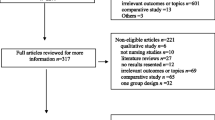Abstract
High-Fidelity Simulation (HFS) is a tool used to expand nursing students’ opportunities to care for critically ill patients while also overcoming limitations often faced during clinical placements. HFS provides students with opportunity to interact within a realistic clinical environment with a patient simulator able to reproduce a wide range of clinical conditions. Professional growth and improved learning outcomes are associated with the level of fidelity in simulation; however, heterogeneity of the adopted HFS definitions and studies reporting lead to a heterogeneity of research results. The aims of this scoping review, that analyzed 69 studies, were to clarify HFS concept, document its related main features, and provide an unambiguous definition of HFS. Thematic analysis of definitions and conceptual frameworks reported in the considered studies allowed for the identification of three main themes that represent the concept of HFS in nursing education: innovative educational strategy, realistic learning experience for skills improvement, and safe experience. Debriefing and pre-briefing were respectively the most common reported features related to HFS. The definition derived from thematic analysis considers HFS as a ‘technology-based educational approach performed in a realistic and safe environment, that uses an interactive patient simulator able to reproduce life-like clinical conditions, allowing students to improve their technical and non-technical skills’.
Access this chapter
Tax calculation will be finalised at checkout
Purchases are for personal use only
Similar content being viewed by others
References
La Cerra, C., Dante, A., Caponnetto, V., Franconi, I., Gaxhja, E., Petrucci, C., Alfes, C.M., Lancia, L.: Effects of high-fidelity simulation based on life-threatening clinical condition scenarios on learning outcomes of undergraduate and postgraduate nursing students: a systematic review and meta-analysis. BMJ Open 9(2), e025306 (2019)
Hallin, K., Bäckström, B., Häggström, M., Kristiansen, L.: High-fidelity simulation: assessment of student nurses’ team achievements of clinical judgment. Nurse Educ. Pract. 19, 12–18 (2016)
Lewis, R., Strachan, A., Smith, M.M.: Is high fidelity simulation the most effective method for the development of non-technical skills in nursing? a review of the current evidence. Open Nurs. J. 6, 82–89 (2012)
Abram, M.D., Forbes, M.O.: High-fidelity simulation: an application to psychopharmacological training for the psychiatric nurse practitioner student. Issues Ment. Health Nurs. 40(3), 260–267 (2019)
Dante, A., La Cerra, C., Masotta, V., Caponnetto, V., Gaxhja, E., Petrucci, C., Lancia, L.: Efficacy of high-fidelity simulation on learning outcomes: immediate results for a postgraduate intensive care nursing course. In: Popescu, E., Gil, A.B., Lancia, L., Sica, L.S., Mavroudi, A. (eds.) Advances in Intelligent Systems and Computing, vol. 1008, pp. 32–39. Springer, Cham (2020)
Tuzer, H., Dinc, L., Elcin, M.: The effects of using high-fidelity simulators and standardized patients on the thorax, lung, and cardiac examination skills of undergraduate nursing students. Nurse Educ. Today 45, 120–125 (2016)
Sherwood, R.J., Francis, G.: The effect of mannequin fidelity on the achievement of learning outcomes for nursing, midwifery and allied healthcare practitioners: systematic review and meta-analysis. Nurse Educ. Today 69, 81–94 (2018)
Tricco, A.C., Lillie, E., Zarin, W., O’Brien, K.K., Colquhoun, H., Levac, D., Moher, D., Peters, M.D., Horsley, T., Weeks, L.: PRISMA extension for scoping reviews (PRISMA-ScR): checklist and explanation. Ann. Intern. Med. 169(7), 467–473 (2018)
Munn, Z., Peters, M.D., Stern, C., Tufanaru, C., McArthur, A., Aromataris, E.: Systematic review or scoping review? Guidance for authors when choosing between a systematic or scoping review approach. BMC Med. Res. Methodol. 18(1), 143 (2018)
European Ministers in charge of Higher Education: The Bologna Declaration of 19 June 1999, Joint Declaration of the European Ministers of Education (1999)
Kolb, D.A.: Experiential Learning: Experience as the Source of Learning and Development, 2nd edn. FT Press, Upper Saddle River (2014)
INACSL Standards Committee: INACSL standards of best practice: SimulationSM simulation design. Clin. Simul. Nurs. 12, S5–S12 (2016)
Author information
Authors and Affiliations
Corresponding author
Editor information
Editors and Affiliations
Rights and permissions
Copyright information
© 2021 The Editor(s) (if applicable) and The Author(s), under exclusive license to Springer Nature Switzerland AG
About this paper
Cite this paper
Masotta, V. et al. (2021). The Concept of High-Fidelity Simulation and Related Factors in Nursing Education: A Scoping Review. In: Kubincová, Z., Lancia, L., Popescu, E., Nakayama, M., Scarano, V., Gil, A. (eds) Methodologies and Intelligent Systems for Technology Enhanced Learning, 10th International Conference. Workshops. MIS4TEL 2020. Advances in Intelligent Systems and Computing, vol 1236. Springer, Cham. https://doi.org/10.1007/978-3-030-52287-2_12
Download citation
DOI: https://doi.org/10.1007/978-3-030-52287-2_12
Published:
Publisher Name: Springer, Cham
Print ISBN: 978-3-030-52286-5
Online ISBN: 978-3-030-52287-2
eBook Packages: Intelligent Technologies and RoboticsIntelligent Technologies and Robotics (R0)




